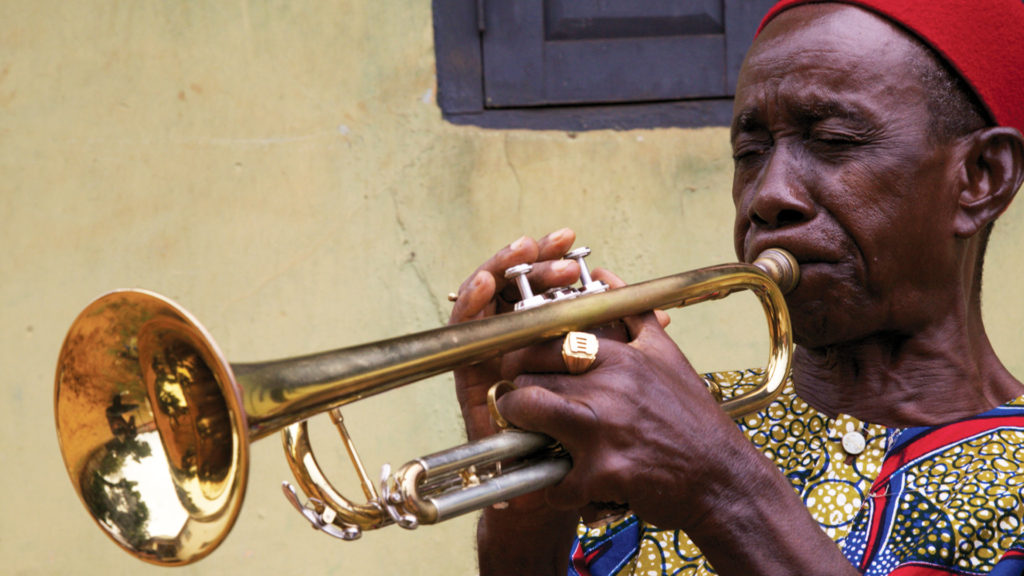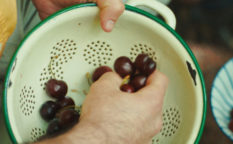Review: Elder’s Corner (2020)

The tumult Nigeria has faced in the post-World War II era makes for sober reading. From new-dawn optimism following liberation from colonial rule in 1960, to the bloodshed of the 67-70 Biafran War and the subsequent see-saw between military and civilian rule, Nigeria has been far from politically steady.
A constant amid the frequent chaos, however, has been the brilliance of the country’s music, which has continued to course through the nation’s veins irrepressibly and defiantly; a flickering flame of hope in even the darkest of chapters. The various movements, from the Caribbean calypso-meets-jazz influence of High Life through to Afrobeat and everything in between, Nigerian song has popped, throbbed and reverberated as the soundtrack to changing times.
Elder’s Corner, a documentary by London-born Nigerian Siji Awoyinka, not only gathers many of the surviving greats of Nigerian music to re-record their lost songs, but weaves their individual stories within the broader picture of Nigeria as it raced through the second half of the twentieth century. The documentary opens with a flurry of song and soundbites. Talking heads pile on top of one another attesting to the magic of the musical form. It is telling that the positive is foreshadowed by a single damning statement that appears at the opening. “It must be the devil’s trick to be born in a country where neither soul nor talent is appreciated,” the voice bleakly opines.
And yet, the witnesses are generally enthusiastic. They remain in good spirits despite the suffering they have endured. The preeminent horn player, E.C. Arinze, who passed away at the age of 85 in 2015, had been the last surviving member of the big band Highlife. He is caught on camera in Elder’s Son at the age of 82 speaking with considerable charm about a bygone era and the role of God and music in life. By this time, he is a chieftain of his hometown, Obosi, and full of gratitude for the life he has lived. A man at peace.

Others speak eloquently of music’s significance in Nigeria’s day to day operations, such as Mary Afi Usuah. The singer espouses how community, culture and environment are glued together by song and dance. It is implied that even when gun shots are fired and blades are slashed, and the climate is one of abject terror, musical expression will find a way out. And that musicians need to participate in the discourse too. Fela Kuti was a high-profile critic of the military rule in the 1970s, and even he suffered at the hands of the powers-that-be when his self-made communal compound [dubbed the ‘Kalakuta Republic’] was deliberately burnt to a cinder in 1977.
The film could be said to suffer from trying to cram too much into its taut 1 hour 37 runtime. It would be a valid charge. Priceless footage lies herein, however, from a pool of survivors who are dwindling by the day. Kuti’s drummer Tony Allen, for example, present here towards the end talking about the emergence of Afrobeat has slipped off this mortal coil in 2020.
Whilst Elder’s Son encapsulates the unique history of Nigeria and its musical evolution from the mid-20th century onwards, universal appeal also lies in how it speaks of music’s capacity to reflect the environment from which it is born; replete with successes and failures, hope and hopelessness. Elder’s Son pounds an impressive udu for the brilliance of Nigerian music. It makes its case very well indeed.
Country: Nigeria, USA
Language: English
Year: 2020
Runtime: 97 min.
Producers: Siji Awoyinka , Ade Bantu , Abby Ogunsanya , Tunji Ladoja , Kay Hung , Edel KELLY
Cast: E.C. Arinze, Pa Fatai “Rolling Dollar”, Emperor Dele Ojo, Kehinde Lijadu, Victor Olaiya, Segun Bucknor, Jimi Lee Adams, King Sonny Brown, Vindo Okoreogo, Randy Weston, Tony Allen
















